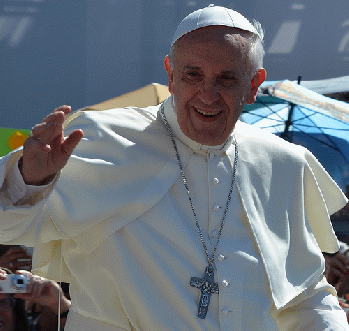Duluth, Minnesota (OpEdNews) March 24, 2019: Pope Benedict XVI (born in 1927; formerly known as Cardinal Joseph Ratzinger of Germany) surprised the world by announcing on February 11, 2013, that he was abdicating as pope. Officially, his papacy began on April 19, 2005, and ended on February 28, 2013. He is still alive and well.
In any event, on March 13, 2013, the cardinal-electors announced the election of Cardinal Jorge Mario Bergoglio of Argentina, a Jesuit (born in 1936), to serve as the new pope of the Roman Catholic Church. In honor of the Italian St. Francis of Assisi, the new pope took the name Francis. Pope Francis did not hold a doctorate in theology or philosophy, but he was charismatic, photogenic, and telegenic unlike his predecessor.
OEN readers may remember that President Barack Obama received the Nobel Peace Prize before he had ever done anything to deserve it that's how upset certain people were with his predecessor, President George W. Bush. Similarly, for understandable reasons, many people had been upset with Pope Francis' predecessor, and so they reflexively cheered for Pope Francis as a welcome change.
For a detailed account of Pope Benedict XVI's mischief, see Matthew Fox's book The Pope's War: Why Ratzinger's Secret Crusade Has Imperiled the Church and How It Can Be Saved (Sterling Ethos, 2011).
For a layered account of Pope Benedict XVI's abdication, see the chapter titled "The Abdication" in the openly gay French journalist Frederic Martel's new book In the Closet of the Vatican: Power, Homosexuality, Hypocrisy, translated by Shaun Whiteside (Bloomsbury Continuum, 2019, pages 516-532).
Incidentally, Martel claims (page 386) that Cardinal Bergoglio was in contention to possibly be elected the next pope in the conclave in which Cardinal Ratzinger was elected in 2005.
In any event, we need to be clear about Cardinal Bergoglio's election.
Had Cardinal Bergoglio not held the church's position against the use of artificial contraception, the cardinal-electors would not have elected him to be the new pope.
Had Cardinal Bergoglio not held the church's position against legalized abortion in the first trimester, the cardinal-electors would not have elected him to be the new pope.
Had Cardinal Bergoglio not held the church's position against ordaining women to be priests, the cardinal-electors would not have elected him to be the new pope.
Had Cardinal Bergoglio not held the church's position against married priests, the cardinal-electors would not have elected him to be the new pope.
Had Cardinal Bergoglio not held the church's position against same-sex marriage, the cardinal-electors would not have elected him to be the new pope.
For Pope Francis, these possible changes in the church's positions are off the table they are not negotiable. For him, the only remaining possible changes that are negotiable are somewhat small changes.
However, for conservative Catholics, even somewhat small possible changes are deemed to be serious existential threats to the status quo. For conservative Catholics tend to feel that their religious convictions are under siege in a hostile secular world.
For his part, Pope Francis criticizes certain conservative Catholics for their supposed "rigidity" as though he were not also guilty of "rigidity" about the church's teachings against artificial contraception, legalized abortion in the first trimester, ordaining women as priests, ordaining married men and women as priests, and same-sex marriage. For Pope Francis, properly selective "rigidity" is a virtue, but what he deems to be improper "rigidity" is not a virtue. See how that works? The proverbial pot calls the kettle black.
(Note: You can view every article as one long page if you sign up as an Advocate Member, or higher).





